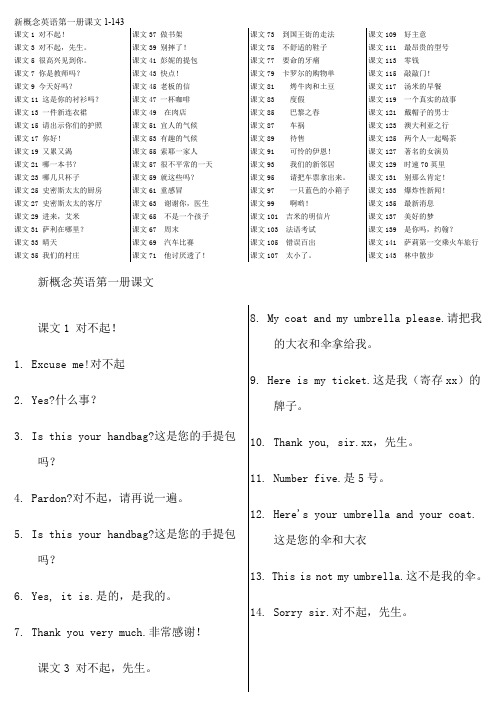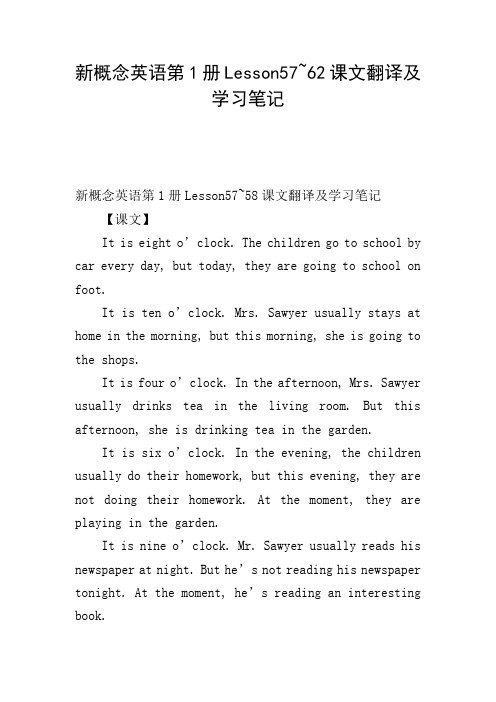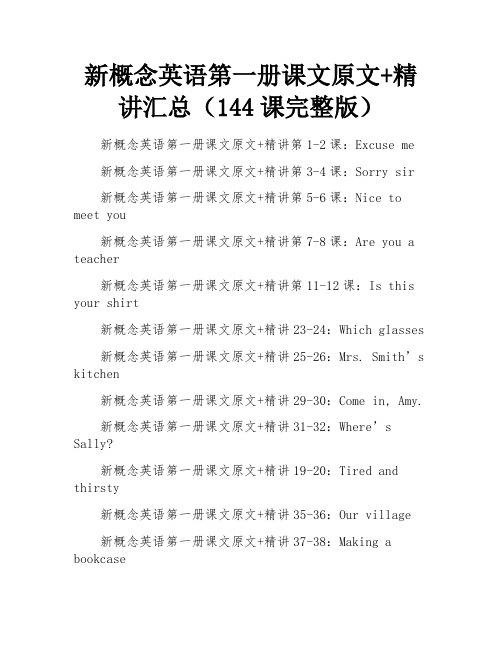新概念英语第一册57课
新概念英语第一册57-58课

时间表达法
1. 询问方法: 几点了? 1) What’s the time ? 2) What time is it? 回答: It is … 2.整点表示法 整点+o’clock (o’clock可以省略) e.g.10点 ten ( o’clock) 12点 twelve (o’clock) 表示在几点 ,用介词at at seven o’clock at eleven o’ctwenty –five past three 4:15 → fifteen past four 5:25→ twenty –five past five
② 半小时后用to表示“差” , 分针位置﹥30 读法(60-分针所指点数)+to+(小时所指点数+1) 3:55 five to four 6:50 ten to seven 9:49 eleven to ten ③ 15 分钟→ a quarter 一刻钟 5:15 a quarter past five / fifteen past five 12:15 a quarter past twelve / fifteen past twelve 3:45 a quarter to four / fifteen to four 8:45 a quarter to nine / fifteen to nine ④ 半小时用half 3:30 half past three 11:30 half past eleven Practice 5:32 4:48 11:58 10:28 6:00 8:30 12:45 3:21 7:02 9:15 12:12 2:02 5:39 11:15 2:50
e.g. What do you usually do at eight o’clock? What do the children usually do at eight o’clock? The children go to school by car every day. What are they doing today? They are going to school on foot.
新概念英语第一册课文1-143

课文1 对不起!课文3 对不起,先生。
课文5 很高兴见到你。
课文7 你是教师吗?课文9 今天好吗?课文11 这是你的衬衫吗?课文13 一件新连衣裙课文15 请出示你们的护照课文17 你好!课文19 又累又渴课文21 哪一本书?课文23 哪几只杯子课文25 史密斯太太的厨房课文27 史密斯太太的客厅课文29 进来,艾米课文31 萨利在哪里?课文33 晴天课文35 我们的村庄课文37 做书架课文39 别摔了!课文41 彭妮的提包课文43 快点!课文45 老板的信课文47 一杯咖啡课文49 在肉店课文51 宜人的气候课文53 有趣的气候课文55 索耶一家人课文57 很不平常的一天课文59 就这些吗?课文61 重感冒课文63 谢谢你,医生课文65 不是一个孩子课文67 周末课文69 汽车比赛课文71 他讨厌透了!课文73 到国王街的走法课文75 不舒适的鞋子课文77 要命的牙痛课文79 卡罗尔的购物单课文81 烤牛肉和土豆课文83 度假课文85 巴黎之春课文87 车祸课文89 待售课文91 可怜的伊恩!课文93 我们的新邻居课文95 请把车票拿出来。
课文97 一只蓝色的小箱子课文99 啊哟!课文101 吉米的明信片课文103 法语考试课文105 错误百出课文107 太小了。
课文109 好主意课文111 最昂贵的型号课文113 零钱课文115 敲敲门!课文117 汤米的早餐课文119 一个真实的故事课文121 戴帽子的男士课文123 澳大利亚之行课文125 两个人一起喝茶课文127 著名的女演员课文129 时速70英里课文131 别那么肯定!课文133 爆炸性新闻!课文135 最新消息课文137 美好的梦课文139 是你吗,约翰?课文141 萨莉第一交乘火车旅行课文143 林中散步新概念英语第一册课文课文1 对不起!1. Excuse me!对不起2. Yes?什么事?3. Is this your handbag?这是您的手提包吗?4. Pardon?对不起,请再说一遍。
学习新概念英语第一册51-60笔记 课文译文生词本音标释义

学习新概念英语第一册51-60笔记课文译文生词本音标释义---------------------------------------------------------新概念英语第1册 51 课 Lesson 51 A pleasant climateWhere do you come from?I come from Greece.What's the climate like in your country?It's very pleasant.What's the weather like in spring?It's often windy in March. It's always warm in April and May, but it rains sometimes. What's it like in summer?It's always hot in June, July and August. The sun shines every day.Is it cold or warm in autumn?It's always warm in September and October. It's often cold in November and it rains sometimes.Is it very cold in winter?It's often cold in December, January and February. It snows sometimes.参考译文Lesson 51宜人的气候汉斯:你是哪国人?迪米特里:我是希腊人。
汉斯:你们的国家的气候是怎么样?迪米特里:气候非常宜人。
汉斯:春季的天气怎么样?迪米特里:3月里常常刮风。
4月和5月的天气总暖洋洋的,但有时下雨。
汉斯:夏季的天气如何呢?迪米特里:6月7月和8月的天气总是炎热的每天都出太阳。
新概念英语第一册第57课课件

It is ten o'clock. Mrs. Sawyer usually stays at home in the morning, but this morning, she is going to the shops.
• • • • What time is it? What’s the time? Could you tell me the time? Excuse me, have you got the time? • What time is it by your watch/ clock?
How to tell the time? Ⅰ 如何表达时间?
• Can you tell me the time? • It's half past seven.
• Excuse me, have you got the time? • Yes. It's a quarter to three.
What time is it?
9:45 1. It’s nine forty-five. ( It’s a quarter to ten.) 现在是九点四十五分。 (现在是差一刻十点。)
• shop [ʃɔp] n. 商店 • v. 逛商店,购物,买东西
• • • • • • I saw both of them at work in the shop. 我看见他们两人都在商店工作。 shopped ;shopped ;shopping I usually go shopping on Sundays. 我通常星期天购物。 I have 3 days free. I'm going to HK to shop. • 我有3天假,我将去香港购物。
新概念英语第一册57课和58课ppt课件

.
Hale Waihona Puke 17注:时刻表上的时间大多采用24小时表示法,这样就不需 要用a.m.表示上午,p.m.表示下午了。
.
13
12 11
10
1 2
9
3
8
4
7
5
6
What's the time?/ What time is it?
.
14
2. It is ten o'clock. Mrs. Sawyer usually stays at home in the morning, but this morning, she is going to the shops.
Lesson 57 An unusual day
.
1
Review
1. seasons spring、summer、autumn/fall、winter 2. months January、February、March、April、May、June、
July、August、September、October 、November、 December
8:00 childre go to school by car going to school
n
on foot
10:00 Mrs. stays at home Sawyer
going to the shops
4:00 Mrs. drinks tea in the drinking tea in
Sawyer living room
现在是8点钟。 孩子们每天都乘小汽车去上学,而今天,他们正步行去上学。
新概念英语第1册Lesson57~62课文翻译及学习笔记

新概念英语第1册Lesson57~62课文翻译及学习笔记新概念英语第1册Lesson57~58课文翻译及学习笔记【课文】It is eight o’clock. The children go to school by car every day, but today, they are going to school on foot.It is ten o’clock. Mrs. Sawyer usually stays at home in the morning, but this morning, she is going to the shops.It is four o’clock. In the afternoon, Mrs. Sawyer usually drinks tea in the living room. But this afternoon, she is drinking tea in the garden.It is six o’clock. In the evening, the children usually do their homework, but this evening, they are not doing their homework. At the moment, they are playing in the garden.It is nine o’clock. Mr. Sawyer usually reads his newspaper at night. But he’s not reading his newspaper tonight. At the moment, he’s reading an interesting book.【课文翻译】现在是8点钟。
孩子们每天都乘小汽车去上学,而今天,他们正步行上学。
现在是10点钟。
上午,索耶夫人通常是呆在家里的,但今天上午,她正去商店买东西。
新概念英语第一册课文译文

《新概念英语第一册课文译文》摘要:butchers 在肉店,test report 最新消息,through the woods 林中散步新概念英语第1册译文Lesson 5 Nice to meet you 很高兴见到你。
Is Chang-woo Chinese?布莱克先生:早上好。
学生:早上好,布莱克先生。
布莱克先生:这位是索菲娅.杜邦小姐。
索菲娅是个新学生。
她是法国人。
布莱克先生:索菲娅,这位是汉斯。
他是德国人。
汉斯:很高兴见到你。
布莱克先生:这位是直子。
她是日本人。
直子:很高兴见到你。
布莱克先生:这位是昌宇。
他是韩国人。
昌宇:很高兴见到你。
布莱克先生:这位是鲁明。
他是中国人。
鲁明:很高兴见到你。
布莱克先生:这位是晓惠。
她也是中国人。
晓惠:很高兴见到你。
Lesson 7 Are you a teacher?你是教师吗?What is Robers job?罗伯特:我是个新学生,我的名字叫罗伯特。
索菲娅:很高兴见到你。
我的名字叫索菲娅。
罗伯特:你是法国人吗?索菲娅:是的,我是法国人。
索菲娅:你也是法国人吗?罗伯特:不,我不是。
索菲娅:你是哪国人?罗伯特:我是意大利人。
罗伯特:你是教师吗?索菲娅:不,我不是。
罗伯特:你是做什么工作的?索菲娅:我是电脑录入员。
索菲娅:你是做什么工作的?罗伯特:我是工程师。
Lesson 9 How are you today?今天好吗?How is Emma?史蒂文:你好,海伦海伦:你好,史蒂文史蒂文:你今天好吗?海伦:很好,谢谢你。
你好吗?史蒂文:很好,谢谢。
史蒂文:托尼好吗?海伦:他很好,谢谢。
埃玛好吗?史蒂文:她也很好,海伦。
史蒂文:再见,海伦。
见到你真高兴。
海伦:我见到你也很高兴,史蒂文。
再见。
Lesson 11 Is this your shirt?这是你的衬衫吗?Whose shirt is white?老师:那是谁的衬衫?老师:戴夫,这是你的衬衫吗?戴夫:不,先生。
新概念英语第一册课文原文+精讲汇总(144课完整版)

新概念英语第一册课文原文+精讲汇总(144课完整版)新概念英语第一册课文原文+精讲第1-2课:Excuse me新概念英语第一册课文原文+精讲第3-4课:Sorry sir新概念英语第一册课文原文+精讲第5-6课:Nice to meet you新概念英语第一册课文原文+精讲第7-8课:Are you a teacher新概念英语第一册课文原文+精讲第11-12课:Is this your shirt新概念英语第一册课文原文+精讲23-24:Which glasses新概念英语第一册课文原文+精讲25-26:Mrs. Smith’s kitchen新概念英语第一册课文原文+精讲29-30:Come in, Amy.新概念英语第一册课文原文+精讲31-32:Where’s Sally?新概念英语第一册课文原文+精讲19-20:Tired and thirsty新概念英语第一册课文原文+精讲35-36:Our village新概念英语第一册课文原文+精讲37-38:Making a bookcaseit!新概念英语第一册课文原文+精讲41-42:Penny’s bag新概念英语第一册课文原文+精讲33-34:A fine day新概念英语第一册课文原文+精讲43-44:Hurry up新概念英语第一册课文原文+精讲45-46:The boss’s letter新概念英语第一册课文原文+精讲47-48:A cup of coffee新概念英语第一册课文原文+精讲53-54:An interesting climate新概念英语第一册课文原文+精讲55-56:The Sawyer family新概念英语第一册课文原文+精讲57-58:An unusual day新概念英语第一册课文原文+精讲59-60:Is that all新概念英语第一册课文原文+精讲61-62:A bad cold新概念英语第一册课文原文+精讲63-64:Thank you , doctor新概念英语第一册课文原文+精讲67-68:The weekend新概念英语第一册课文原文+精讲69-70:The car race新概念英语第一册课文原文+精讲71-72:He’s awfulKing Street新概念英语第一册课文原文+精讲75-76:Unfortable shoes新概念英语第一册课文原文+精讲77-78:Terrible toothache新概念英语第一册课文原文+精讲81-82:Roast beef and potato新概念英语第一册课文原文+精讲83-84:Going on a holiday新概念英语第一册课文原文+精讲85课:Paris in the Spring新概念英语第一册课文原文+精讲87课:A car crash新概念英语第一册课文原文+精讲89课:For sale新概念英语第一册课文原文+精讲91课:Poor Ian新概念英语第一册课文原文+精讲93课:Our new neighbor新概念英语第一册课文原文+精讲95课:Ticket, please.新概念英语第一册课文原文+精讲97课:A small blue case新概念英语第一册课文原文+精讲99课:Ow!新概念英语第一册课文原文+精讲101课:A card from Jimmytest新概念英语第一册课文原文+精讲105课:Full of mistakes新概念英语第一册课文原文+精讲107课:It’s too small新概念英语第一册课文原文+精讲109课:A good idea新概念英语第一册课文原文+精讲111课:The most expensive model新概念英语第一册课文原文+精讲113课:small change新概念英语第一册课文原文+精讲115课:Knock,knock新概念英语第一册课文原文+精讲117课:Tommy’s breakfast新概念英语第一册课文原文+精讲119课: A true story新概念英语第一册课文原文+精讲121课: The man in the hat新概念英语第一册课文原文+精讲123课: A trip to Australia新概念英语第一册课文原文+精讲125课: Tea for two新概念英语第一册课文原文+精讲127课: A famous actress新概念英语第一册课文原文+精讲129课: 70 miles an hour新概念英语第一册课文原文+精讲133课: Sensational news新概念英语第一册课文原文+精讲135课:The latest新概念英语第一册课文原文+精讲139课:Is that you新概念英语第一册课文原文+精讲第141课:Sally’s first新概念英语第一册课文原文+精讲131课:Don’t be so sure。
- 1、下载文档前请自行甄别文档内容的完整性,平台不提供额外的编辑、内容补充、找答案等附加服务。
- 2、"仅部分预览"的文档,不可在线预览部分如存在完整性等问题,可反馈申请退款(可完整预览的文档不适用该条件!)。
- 3、如文档侵犯您的权益,请联系客服反馈,我们会尽快为您处理(人工客服工作时间:9:00-18:30)。
It is six o’clock.
In the evening, the children usually do their homewo but this evening, they are not doing their homework At the moment, they are playing in the garden.
today /go to school on foot
They are going to school on foot today. Do exercises
at the moment:现在,此刻 for a moment:一会儿 at any moment:任何时候 at the last moment:在最后一刻 in a moment:不久 at the very moment:就在非常的那一刻 at that moment:就在那一刻
What's the time?/ What time is it?
But this morning, she is going to the shops.
It is four o’clock.
In the afternoon, Mrs. Sawyer usually drinks tea in the living room.
But this afternoon, she is drinking tea in the garden.
but Today he is shaving now.
?
What does he usually do in the morning?
They usually…but today they are….
1.they/every day/go/to school by car
What do they usually do in the morning? They usually go to school by car every day.
It's … o'clock. (表示整点)
half (表示半点) It's half past eight. It's half past ten.
quarter (表示一刻钟) a quarter A quarter past one.
to (表示半点以后) Ten to seven. Twenty to four. Two to two.
It is nine o’clock. Mr. Sawyer usually reads his newspapers at night. But he’s not reading his newspaper tonight.
At the moment, he’s reading an interesting book.
o'clock adv. 点钟 shop n. 商店 moment n. 片刻,瞬间
shopping center:购物中心
shopping mall:大型购物中心 [mC:l]
supermarket:超市 go to the shops go shopping window shop [只看不买] do some shopping
Grammar: S.+ do/does… S.+ am/is/are +doing… …usually do/does… But today,…am/is/are+ doing…
1.What’s the time? It’s…o’clock.
2.He usually shaves at seven o’clock in the morning.
o’clock
moment
shop
It is eight o’clock. The children go to school by car every day,
but today they are going to school on foot.
It is ten o’clock.
Mrs. Sawyer usually stays at home in the morning.
It's a quarter to four. It's a quarter past nine. It's a quarter to seven.
phrases: • By car/plane/train/ship/… • On foot = walk • Stay at home • Go to the shops • Drink tea • In the garden • At the moment • An interesting book
